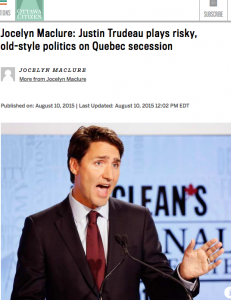Guest post by Michael Nafi, Department of Humanities, Philosophy and Religion, John Abbott College
Bill C-14 on Medical Assistance in Dying has given rise to much debate in the Canadian House of Commons, in the mainstream media and various blogs, with both consensus and dissension stretching across the French/English language divide. The tide is unlikely to subside as the Bill moves to the Senate. Furthermore, as the parliamentary session nears its end, speculations abound on the fate of the Bill after the Liberal majority government today missed the June 6th deadline for its required legislative response to the Supreme Court (SCC) ruling in Carter v. Canada.
Critics have pointed out a number of shortcomings of the Bill and called for a number of amendments. However, regardless of the final form the law might take, there can be little doubt that the issue of medical assistance in dying will be revisited in the future on at least two fronts: i) the exclusion of persons under the age of 18 from such medical assistance and ii) the rejection of the possibility for persons who anticipate a deterioration of their health to provide advance directives to end their life in the future.… Continue reading

